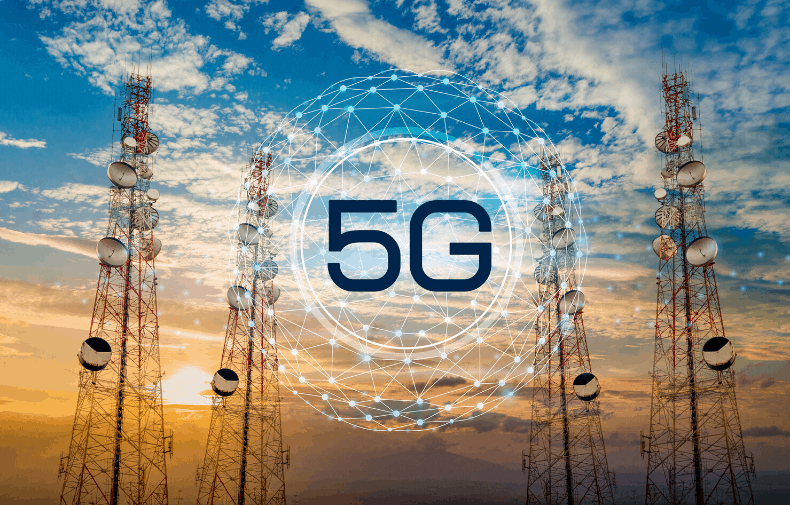The Future of 5G
How and why 5G is going to revolutionize the way businesses (and people) operate
Modern technology is starting to look more and more like science fiction these days — what with IoT sensors and devices being integrated everywhere, from self-driving trucks and artificial intelligence to virtual reality and who knows what’s next.
The crazy thing is, we’ve only scratched the surface.
State-of-the-art 5G technology will soon allow our planet to generate data on everything we do. You thought the world was hyper interconnected now? Just wait. It won’t be long before your shoes, appliances, and even your pets will be connected.
5G Statistics: A World Connected
According to Forbes, there will be an estimated 30 billion connected devices in the world by 2020. By 2025, this number is predicted to be north of 75 billion connected devices. Some are predicting that the Internet of Things (IoT) is going to explode even more rapidly, with some reports suggesting over 1 trillion connected devices by 2025.
In large part, the deployment of 5G is driving this growth. What’s more, many experts believe these numbers are on the conservative side because there are technologies that have yet to be invented that will spur even faster growth.
5G promises 100 times faster speeds than we currently experience today with 4G, while reducing latency to just a few milliseconds. In addition, there will be at least two carriers to create network redundancy, which means limited downtime.
In light of these statistics, an important question remains:
What does this highly reliable, low latency, and high bandwidth future mean for your business?
That’s the question we’ll attempt to answer in this article as we break out the crystal ball.
5G and IoT: What to expect
It’s hard to imagine the sheer scale and magnitude of growth IoT and connected devices will experience in the next decade. Whatever the final count is, what you can absolutely count on is just about every industry to be impacted in some way. The immense amounts of data that can be analyzed to improve efficiencies and improve our lives is staggering.
While it’s impossible to cover all the ways 5G will impact society in a single article, here are a few major trends we predict will affect businesses and our personal lives in transformative ways:
Wearables
Google, Samsung, Garmin and Apple have all embraced the wearable accessories space. The wearable trend continues to grow with wearable phones, wearable computers, or glasses that can tell you the time, temperature and even play your favorite movie. Virtual reality (VR) and augmented reality (AR) are already on the horizon, and 5G will help improve the usability of these technology — thus improving adoption rates.
Smart Home
Lights, air conditioning, doors, video cameras, recording shows — all will be able to be controlled from your smartphone, anywhere in the world. In fact, much of this technology is already here.
So what’s next? For starters:
- Knowing exactly where your dog is at all times through a connected collar
- A grocery list that creates itself, then orders and delivers the items to your doorstep
- Alerts and alarms that notify you when items in the home are reaching their end of life ( light bulbs, air filters, etc.)
These innovative examples of automation in the home will soon become normal. Automation in the home is going to be even more possible and accessible with 5G. More analytics will be able to identify and solve issues in the home.
Connected Cars
Up to this point, the connected car has been about vehicle maintenance. In the next wave of connected auto tech, it’s going to be much more about the comfort and experience of the passenger and driver. This includes in-car 5G WiFi for all users, real-time map updates so you can find the fastest route and make adjustments immediately, and — coming sooner than you might think — the autonomous (self-driving) car.
Soon, thanks to integration with your smartphone, you’ll be talking to your car and be able to control all your applications (such as smart home apps). For instance, if you forgot to close the garage door on your way out, you can close it directly from the driver or passenger seat.
5G will drive these enhancements due to the massive increases in connectivity.
Industrial Internet (AI)
Smart machines will not only be connected, they’ll be able to learn and improve on processes as the data is collected from sensors using sophisticated software. Smart machines will be more accurate and consistent than humans. Yes folks, this is the beginning of artificial intelligence.
Quality control, sustainability, tracking goods and real-time information exchange about inventory will all ultimately be impacted through automation. It’s likely that AI is going to change our lives more than any other technology — and it’s all made possible by 5G.
Smart Cities
In the cities of the future, IoT and 5G will help solve major issues like smog, energy shortages, traffic congestion, planning and development, city maintenance and municipal services. Streetlights will have the ability to collect and send information. Waste collection will know when trash bins are full and when to collect them. Parking meters will no longer need to be physically read. Streets will be connected more than ever with the ability to integrate mapping applications to provide the fastest routes based on real-time congestion.
Agriculture
In a finite world where the global population continues to rise exponentially, the agriculture industry has a tough challenge on its hands. Improving efficiencies will be a key strategy in keeping pace with this growing demand.
The future of farming will soon involve:
- Sensing for soil moisture content and nutrients
- Controlling water usage for plant growth
- Determining when to water and what nutrients are deficient
- Automating the release of nutrients into the water
- Automating the right amount of water for optimal growth rates
This is smart farming, and it’s only going to get better with the ubiquity of 5G.
Retail & Restaurants
The impact of IoT in retail is expected to be enormous. Imagine placing an order with your smartphone and as you drove up to the facility, your order was placed in a queue and ready for you when you walk in the door.
Ordering food can involve this same experience. Beacon technology interacting with smartphones will allow retailers and restaurants to serve their customers better and provide a more customer-centric experience based on where a person is in the store and what their shopping habits are.
The days of cash registers are soon going to be a thing of the past because you’ll be able to pay and check-out using your smartphone. Connectivity is going to make the possibilities limitless for this industry.
Smart Energy Grids
Data collection will allow energy providers to identify and analyze customer behavior, and automate the efficient supply of electricity. Power outages will be detected more quickly, all the way down to the individual household. This will allow outages to be addressed more efficiently by providing alternative sources to the home, making it possible for a distributed energy system.
Healthcare
Through the integration of wearables, smartphones and healthcare providers, it’s predicted that doctors will be able to diagnose potential health conditions (such as a heart attack) in patients using alerts and analytics. Imagine being able to identify cancer based on certain symptoms or characteristics of a patient as they go about their daily lives.
The possibilities in healthcare are exciting as we increasingly provide our doctors with data from wearables that monitor our well-being round-the-clock. 5G makes this possible, and it will change the way healthcare is administered through IoT, AI and automation.
5G Availability: The Roadmap Forward
All of these benefits of 5G are exciting to be sure, but when can we actually expect them to be available to the public?
Sooner than you might think…
In fact, all the major providers have already made their 5G plans public:
- Verizon launched in Chicago and Minneapolis on April 11, 2019, and plans to expand into 30 markets by the end of the year.
- AT&T has already launched “5GE” (which is actually just 4G on steroids) in 12 markets, and the company plans to launch actual 5G later in 2019.
- T-Mobile‘s IAS service plans to integrate 5G in 2019 as well, but thus far they’ve been more vague about when and where.
- Sprint, in large part due to merger discussions, is pretty much mirroring the plans of T-Mobile.
As for the other major telecom providers, 5G likely won’t be a nationwide reality until about 2021.
Based on where things currently stand, it looks like Verizon will be the first to market with a true nationwide offering, and they’re suggesting this will come sometime in 2020. But for the sake of being conservative, let’s give them an extra year and say 2021 because these roll-outs tend to take lots of time, money and resources to get them off the ground.
The good news is that the infrastructure is already in place, the technology is tested and working, and the consumer and business demand is most certainly there. So telecom companies have every incentive to get their 5G networks up and operating in the shortest time possible.
5Gs Impact on Business
For business owners, right now is the time to get ahead of your competition. As discussed in this document, 5G is coming fast and it will change the way your business operates in one way or another. Start thinking about your systems today to consider how 5G will impact those processes.
How will 5G and connectivity affect sales, operations, HR? What about IT — how are they going to keep your business secure as all these devices and sensors become connected and vulnerable?
There are lots of questions that will need to be answered and plans to be made. Now is the perfect time to start having those discussions with your individual business units. We recommend developing a strategy as soon as possible for this single reason:
If your competition embraces this technology before you do, it will put them that much further ahead.
There’s no question that 5G is going to change all of our businesses and our lives. It’s now just a question of how much.
About Wired Networks
Wired Networks is a telecom solutions provider founded by Wired Networks’ founder Jeremy Kerth and head engineer Steve Roos after they realized there was a deep market need for helping mid-size businesses establish better uptime rates for their Wide Area Networks (WANs). Armed with the best-in-class carriers and partners, Jeremy and Steve set out with a bold plan: Guarantee better uptime rates than the industry standard of only 99.5%.
Their bold plan became a reality. Wired Networks’s solutions guarantee clients 99.99% (even 99.999%) network uptime. But we don’t stop there. Many telecom providers promise high availability network solutions but fail to deliver because they’re in the business of providing services, not solutions.
That’s the Wired Networks difference: We deliver highly available networks by providing a complete system (called “Cloud Assurance”) that ensures 99.99% or above uptime.
We deliver this bold promise by:
- Owning the entire customer experience. From pricing, contracting, ordering and provisioning to installing, servicing and billing—we do it all! This means no stressful negotiations, confusing setups, or finger pointing if something goes wrong. We actually deliver on our promise.
- We manage the entire system, and monitor and manage issues as they occur so you can focus on your business—not your network.
The Wired Networks solution is like no other. Contact us to get started and experience the difference of a system that truly delivers on its 99.99% network uptime promise.




